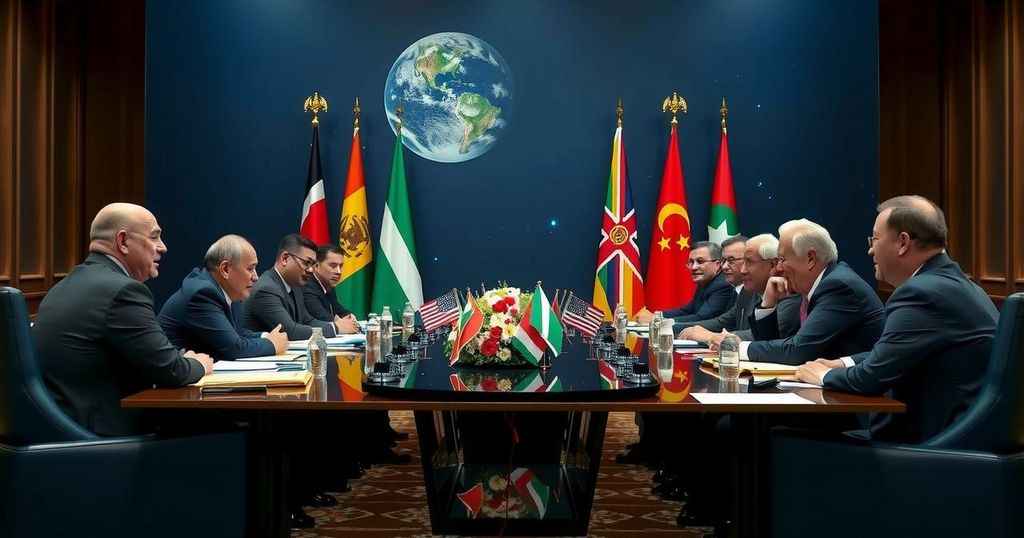Putin Hosts BRICS Summit to Forge New World Order and Challenge Western Dominance

Russian President Vladimir Putin hosted the BRICS Summit to discuss a new world order aimed at reducing reliance on the U.S. dollar and challenging Western dominance. The summit saw participation from over two dozen nations, including leaders from China and India, who expressed desires for improved relations. As BRICS expands, members explore alternatives to the SWIFT payment system while advocating for reform to global institutions to better support the Global South.
This week, Russian President Vladimir Putin convened more than two dozen countries for the BRICS Summit, aimed at redefining global dynamics in favor of a new world order independent of Western influence, particularly the dominance of the U.S. dollar. The summit, held in Kazan, Russia, provided Putin with a significant international platform following the invasion of Ukraine in 2022. A primary objective of this alliance is to reduce dependency on the dollar, thereby evading sanctions imposed by Western nations. During the summit, President Putin remarked, “The dollar is being used as a weapon. We really see that this is so. I think that this is a big mistake by those who do this.” In a notable development, Chinese President Xi Jinping and Indian Prime Minister Narendra Modi used the summit to highlight their aspirations for improved bilateral relations, especially after a recent military agreement aimed at resolving their prolonged tensions over a disputed region in the Himalayas. As BRICS (comprising Brazil, Russia, India, China, and South Africa) expands its membership, new nations such as Iran, Egypt, and Saudi Arabia have recently joined, increasing the bloc’s representation of global population and economic output. However, while Russia champions a shift away from the West, countries like India and Brazil prefer a moderate approach and envision the alliance as a platform for reforming international economic and political structures to better serve developing nations. Moreover, the summit revealed Russia’s interest in establishing alternative financial systems that could counter the U.S.-dominated SWIFT system, although a coherent plan to replace the dollar has yet to be proposed. Iranian President Masoud Pezeshkian criticized the imbalance created by Western policies, stating, “Over more than three decades since the collapse of the bipolar system, it has become increasingly clear that from the perspective of Western powers, peace, democracy, prosperity, and development can only be achieved through pathways defined by them.” The meeting signifies a pivotal moment in international relations, as member states are strategizing ways to navigate the geopolitical landscape that is increasingly characterized by polarization between Western and non-Western powers.
The BRICS summit represents a collective effort by emerging economies to challenge the long-standing economic supremacy of the West, particularly the United States. The alliance seeks to establish a new financial architecture that diminishes the influence of the U.S. dollar and encourages greater economic cooperation among member nations. Additionally, the summit takes place in the context of increasing geopolitical tensions and economic sanctions, pushing members to explore alternatives that reflect their own interests and developmental goals.
In summary, the BRICS Summit serves as a crucial platform for member nations to advocate for a shift in the global economic power balance. As the bloc grows to encompass a significant portion of the world’s population and economic output, its leaders, particularly from Russia, China, and India, seek to minimize reliance on the U.S. dollar and challenge Western hegemony. The discussions at the summit underscore the necessity for reform within international systems to better serve the demands of developing nations.
Original Source: www.foxnews.com








